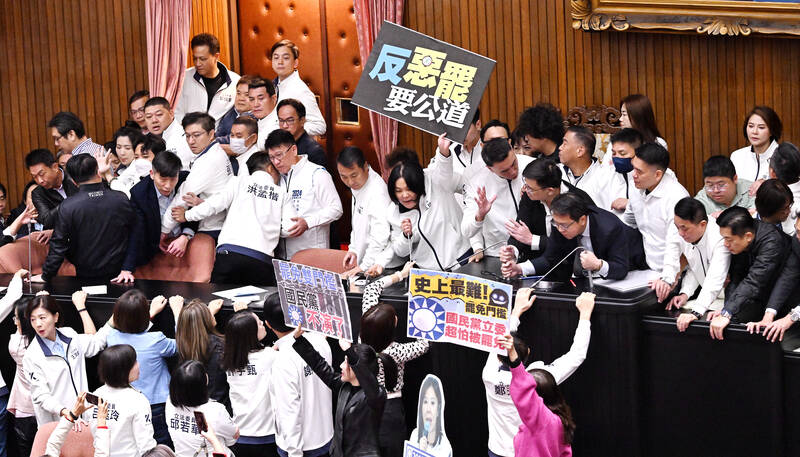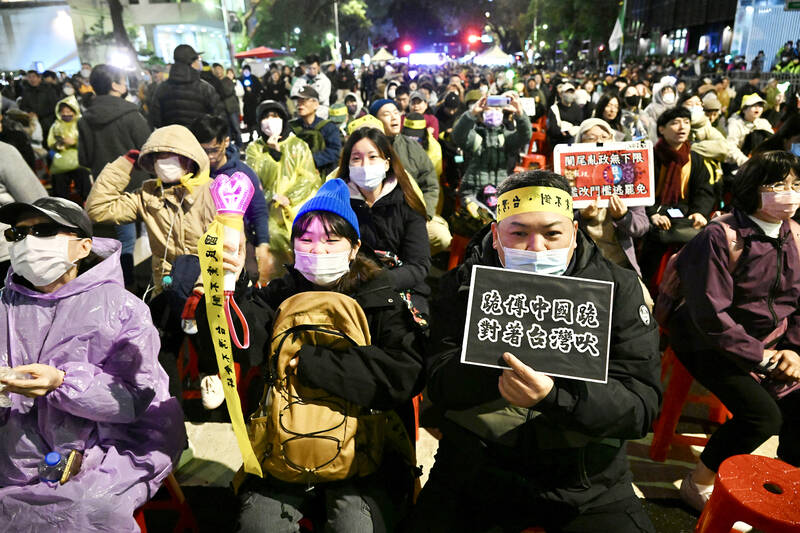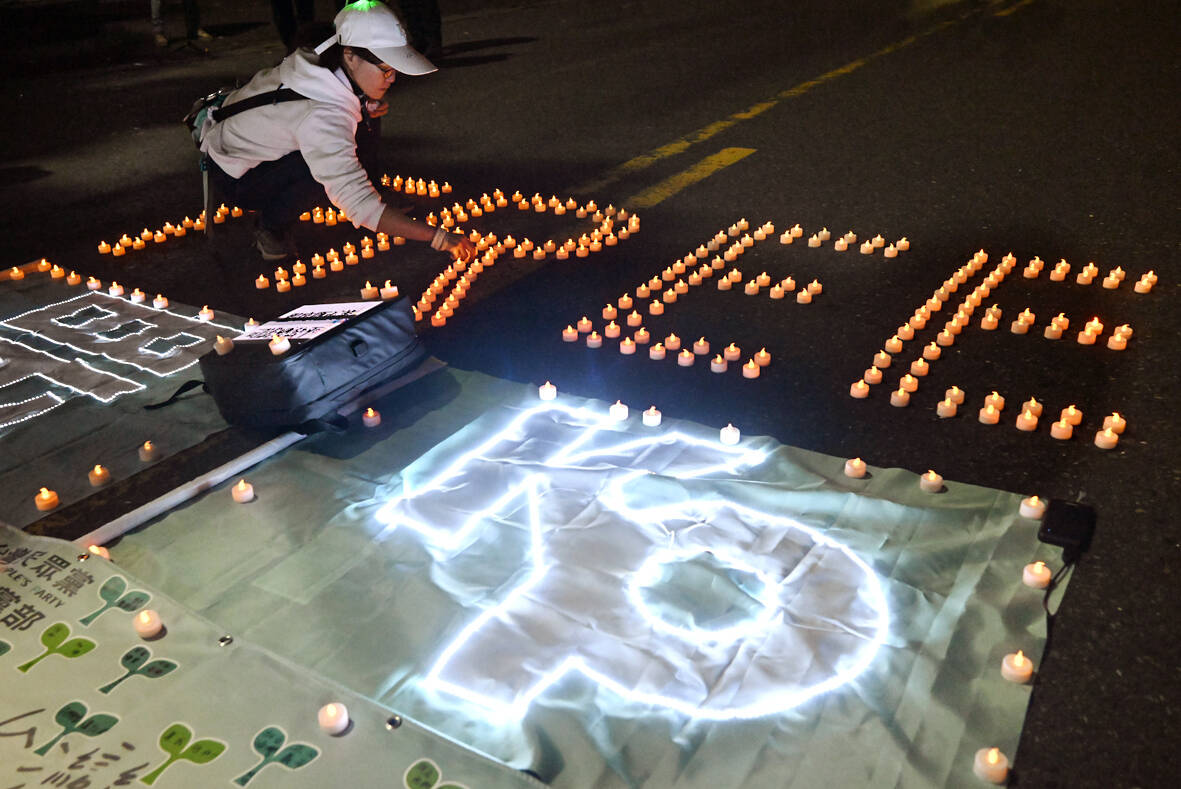Power struggles are never pretty. Fortunately, Taiwan is a democracy so there is no blood in the streets, but there are volunteers collecting signatures to recall nearly half of the legislature.
With the exceptions of the “September Strife” in 2013 and the Sunflower movement occupation of the Legislative Yuan and the aftermath in 2014, for 16 years the legislative and executive branches of government were relatively at peace because the ruling party also controlled the legislature.
Now they are at war. The Democratic Progressive Party (DPP) holds the presidency and the Executive Yuan and the pan-blue coalition led by the Chinese Nationalist Party (KMT) and the smaller Taiwan People’s Party (TPP) hold a majority in the legislature.

Photo: Liu Hsin-de, Taipei Times
Though originally billing themselves as a “white” force (they initially briefly used the awful translation “white power”) between the pan-blue and pan-green camps, the TPP now is as much a part of the pan-blue camp as the People’s First Party and New Party were when the term “pan-blue” was coined to describe their united voting bloc in 2000.
Up until 2016, the KMT either outright, or in a KMT-led pan-blue coalition, controlled the legislature. The last eight years no doubt were a frustrating shock to the party, only able to bleat feebly from the sidelines as the DPP steamrolled them on big issues. They finally got to discover how the DPP felt for all those years.
For the TPP, this is the first time they have had national influence. Though largely following the KMT’s lead, the TPP gets to add their input and sometimes tinker with the details of draft bills.

Photo: Peter Lo, Taipei Times
The last time the government was split this way was during the Chen Shui-bian (陳水扁) presidency of 2000-2008. That era is still remembered for its political chaos.
BATTLE OVER LEGISLATIVE REFORM
President William Lai (賴清德) is a far more level-headed person than Chen, and far more politically savvy.

Photo: Liao Chen-huei, Taipei Times
So far, he has worked hard to not raise tensions, refrained from taking rash actions and reigned in some of the more constitutionally dubious ideas put forth within the DPP. That does not mean the DPP is taking it lying down. The first big challenge put forth by the pan-blue bloc was a series of legislative reform proposals that would have given the legislature the right to grill government officials, and if they were deemed to have not complied or not been truthful, the legislature would be given teeth to prosecute them. It could have been a serious security risk that could have forced officials to publicly reveal national security secrets.
It was also so flagrantly unconstitutional it is a wonder they even bothered — essentially, they were trying to take control of the functions of three other branches of government, the Judicial Yuan, the Control Yuan and the Executive Yuan’s Ministry of Justice. Of course the Constitutional Court removed chunks of the law.
There was brawling in the legislature as the DPP attempted to physically block passage, and some lawmakers took minor injuries. On the more amusing side, a DPP lawmaker managed to grab the bill and run off with it.
Ultimately, the DPP scored more points politically in spite of turning some voters off with their violent antics because it inspired the “Bluebird Action” (青鳥行動) movement which brought out tens of thousands of people to protest the bill over multiple days.
For the first time that I can recall, Taiwan now has two opposing popular “youth” movements, the pan-green Bluebirds and the “little sprout” (小草) supporters of the TPP. Both have drawn tens of thousands to their rallies.
If the TPP’s founder Ko Wen-je (柯文哲), currently in jail on charges of corruption and stealing campaign funds, is exonerated he will have a large pool of fervent supporters in the “little sprouts” that could be formidable. It is not looking good for Ko, though, as guilty pleas by other defendants are coming forward.
BATTLE OVER THE CONSTITUTIONAL COURT
The pan-blue camp passed legislation requiring the Constitutional Court to have 10 sitting members and a supermajority of two-thirds to render a ruling. President Lai kicked it back to the legislature for reconsideration, but they sent it back to the administration unchanged.
President Lai then promulgated the law as is constitutionally required.
The problem is that the terms of the seven judges ended last fall, leaving the court with only eight members — or two less than the new law mandates to make a ruling. Then, the pan-blue camp rejected all seven of the president’s nominees.
Constitutionally, can the Constitutional Court now rule on this law? Legal experts are divided.
Pan-green supporters accuse the pan-blues of intentionally creating a constitutional crisis so they can pass laws with no judicial oversight. Pan-blue supporters note that the two-thirds supermajority was the standard until 2022 and requiring two-thirds present is not unusual in other countries.
BATTLE OVER THE BUDGET
The KMT had proposed a 3.47 percent cut to the proposed budget, but it was negotiated down to about 3 percent in a second reading on Jan. 17. Then, unexpectedly over that weekend a group of pan-blue lawmakers slashed a lot more, many of which seemingly at random.
This raised the cuts to 6.6 percent, which was passed by the opposition without the customary cross-caucus deliberations.
Additionally, large amounts in the budget were frozen, including half of the indigenous submarine program. To unfreeze the budgets, the opposition is demanding the government to justify to them why these budget items are important or necessary.
The premier and cabinet have warned about possible cuts to services, including key health, emergency response and national security budgets — warning even that local governments would have to take up more of the burden of emergency responses.
The opposition argues that it is providing oversight and cutting waste, which in some cases may be the case. But the cuts do not appear at all well thought out and there has been pushback from some pan-blue supporters over cuts to budgets that matter to them, such as Hakka programming and budgets for the pan-blue leaning bureaucrats.
They also point out that this year’s budget is still the largest ever and is nearly one-third larger than the budget in 2019. However, this claim assumes that every budget item frozen will be unfrozen, which the DPP accuses the KMT of having no intention of doing.
The president returned the budget to the legislature for reconsideration.
SOME THINGS ARE NOT ADDING UP
Outrage and panic is coming from pan-green supporters who are accusing the pan-blues of paralyzing the government, provoking a constitutional crisis to seize more power, slashing funding for cultural programs that promote a localized culture and weakening the military — all to the benefit of the Chinese Communist Party (CCP).
Is this an accurate portrayal? I initially thought so and still think if things go badly it could come to pass. Certainly, some in the KMT caucus would like it to play out this way.
Yet some indications suggest that there is more to this story going on strategically on both sides. The clues are in President Lai’s responses, which superficially do not make sense.
It is also strategically problematic for the KMT, whose leadership is politically savvy.
This fight is far from over. Tune in to our next column for the deep dive into that.
Donovan’s Deep Dives is a regular column by Courtney Donovan Smith (石東文) who writes in-depth analysis on everything about Taiwan’s political scene and geopolitics. Donovan is also the central Taiwan correspondent at ICRT FM100 Radio News, co-publisher of Compass Magazine, co-founder Taiwan Report (report.tw) and former chair of the Taichung American Chamber of Commerce. Follow him on X: @donovan_smith.

It’s a good thing that 2025 is over. Yes, I fully expect we will look back on the year with nostalgia, once we have experienced this year and 2027. Traditionally at New Years much discourse is devoted to discussing what happened the previous year. Let’s have a look at what didn’t happen. Many bad things did not happen. The People’s Republic of China (PRC) did not attack Taiwan. We didn’t have a massive, destructive earthquake or drought. We didn’t have a major human pandemic. No widespread unemployment or other destructive social events. Nothing serious was done about Taiwan’s swelling birth rate catastrophe.

Words of the Year are not just interesting, they are telling. They are language and attitude barometers that measure what a country sees as important. The trending vocabulary around AI last year reveals a stark divergence in what each society notices and responds to the technological shift. For the Anglosphere it’s fatigue. For China it’s ambition. For Taiwan, it’s pragmatic vigilance. In Taiwan’s annual “representative character” vote, “recall” (罷) took the top spot with over 15,000 votes, followed closely by “scam” (詐). While “recall” speaks to the island’s partisan deadlock — a year defined by legislative recall campaigns and a public exhausted

In the 2010s, the Communist Party of China (CCP) began cracking down on Christian churches. Media reports said at the time that various versions of Protestant Christianity were likely the fastest growing religions in the People’s Republic of China (PRC). The crackdown was part of a campaign that in turn was part of a larger movement to bring religion under party control. For the Protestant churches, “the government’s aim has been to force all churches into the state-controlled organization,” according to a 2023 article in Christianity Today. That piece was centered on Wang Yi (王怡), the fiery, charismatic pastor of the

Hsu Pu-liao (許不了) never lived to see the premiere of his most successful film, The Clown and the Swan (小丑與天鵝, 1985). The movie, which starred Hsu, the “Taiwanese Charlie Chaplin,” outgrossed Jackie Chan’s Heart of Dragon (龍的心), earning NT$9.2 million at the local box office. Forty years after its premiere, the film has become the Taiwan Film and Audiovisual Institute’s (TFAI) 100th restoration. “It is the only one of Hsu’s films whose original negative survived,” says director Kevin Chu (朱延平), one of Taiwan’s most commercially successful